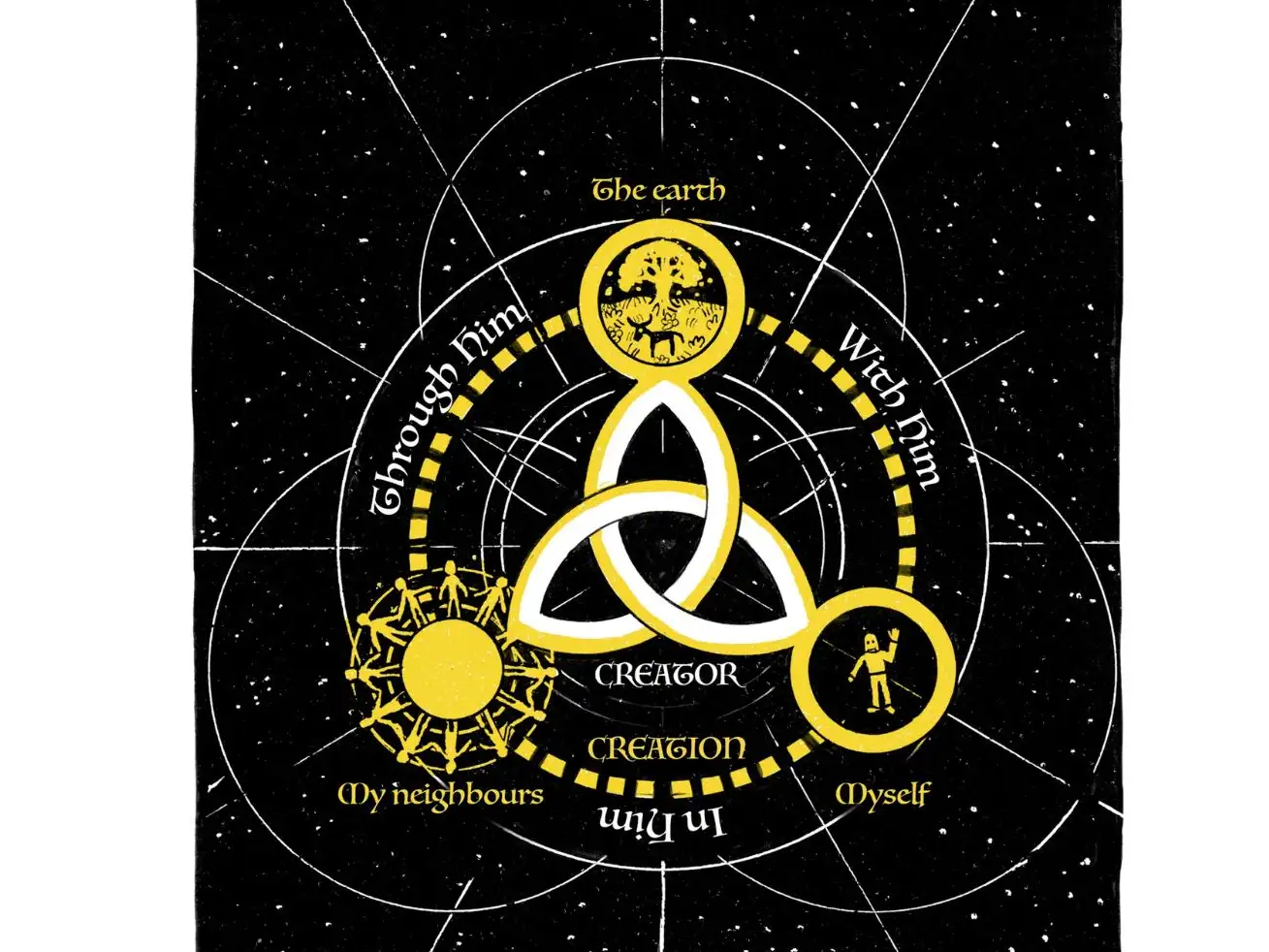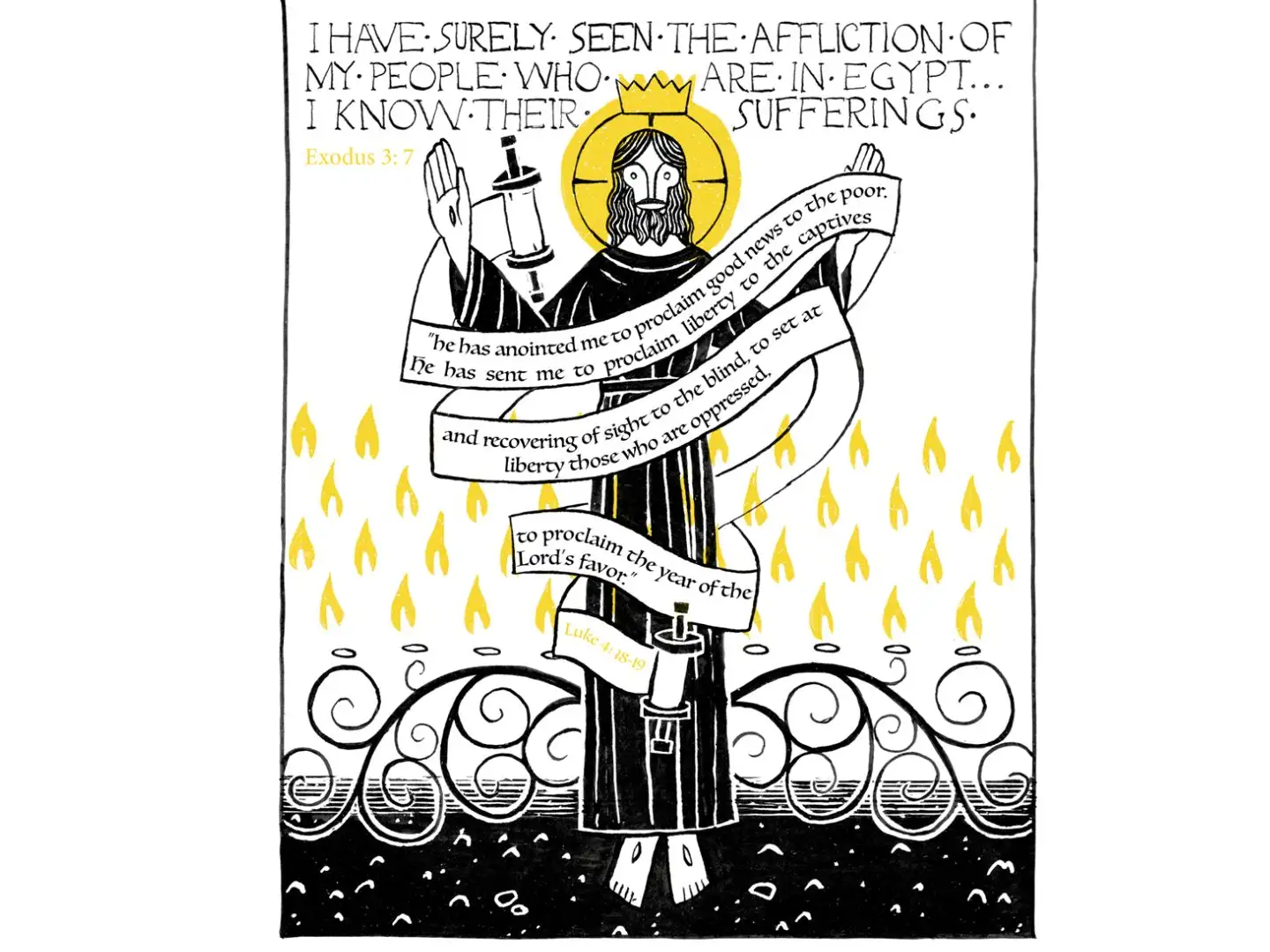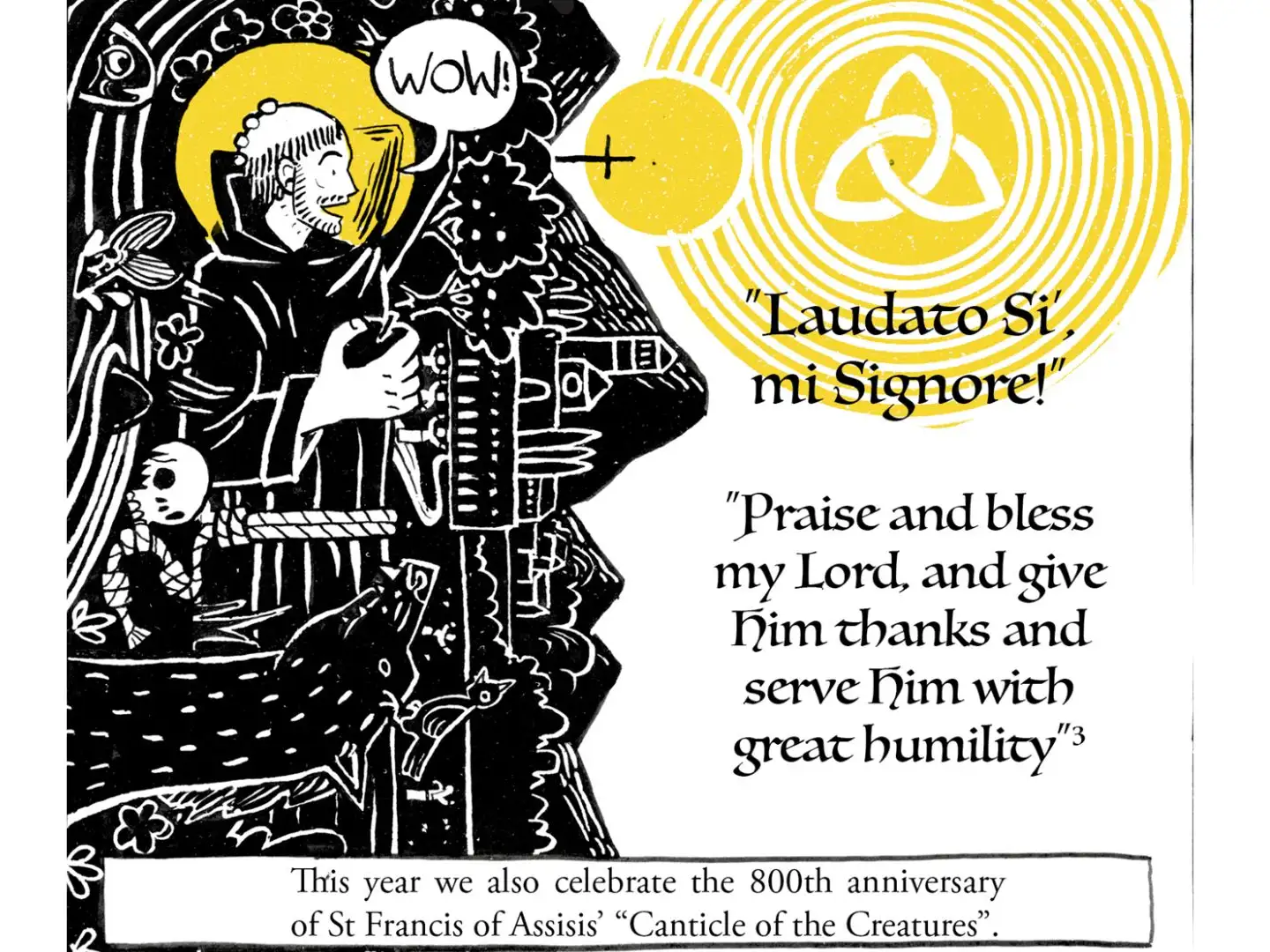Spiritual practices for the Jubilee Year
Would you like to deepen your faith in this Jubilee Year? Register to join our webinars exploring Jubilee themes.
The Sabbath, and by extension the Jubilee year, is about communal rest – rest for the earth and rest for people. It calls us to avoid overwork and a preoccupation with material gain, but also to care for the well-being of the planet and make sure that all people have the opportunity for rest.
For our Jubilee webinar on rest we were joined by Sr Margaret Atkins, a Canoness of St Augustine in the community at Boarbank Hall in Cumbria, who shared the input below. We are grateful to her and to John Paul de Quay of the Ecological Conversion Group who created the images used here.

We experience time in different ways which also go together and can both been seen in the image of the bicycle.
We experience time in cycles, like the wheels of the bicycle going around and around - for example night and day and cycle of the year.
We experience time as a journey - from a to b, from birth to death and death to rebirth.
But because we are human, the cycles and journeys can go wrong.
The cycles can get rusty - the rhythms of our lives can get out of sync.
The direction can go wrong - we can get lost
And this is why we need rest - to renew and re-energise the cycles and to refocus our direction. We have this built-in need for a rhythm of work/rest(oration)
There are different kinds of tiredness - physical exhaustion, mental tiredness, emotional strain, social overload, world-weariness, monotony and loneliness. Therefore different kinds of rest and leisure are needed - sleep, relaxation, fun, outdoors, exercise, silence and solitude, variety, communal enjoyment.
The Bible offers a way to renew both cycles and journeys through the idea of Sabbath. Sabbath gives us a rhythm of rest precisely through refocusing on God.

This image emphasises the importance of putting the Creator at the centre. If we don't do so then our other relationships will go wrong. The biblical Sabbath puts God back at the centre.
Renewing creation
The commandment to observe the Sabbath recalls the Creation story in Genesis and the recreation of Jesus through the resurrection. To celebrate Sunday properly is to renew creation.
Sunday as worship and refocusing
John Paul II's apostolic letter Dies Domini reminds us of the importance of keeping Sabbath.
Insofar as this "remembrance" is alive, full of thanksgiving and of the praise of God, human rest on the Lord's Day takes on its full meaning.
Sunday as resting
The Sabbath is not meant to be about rigidity or judgement but rather renewal. The rest is there to renew us. It renews our physical, mental and spiritual energies. It allows us to see and be seen.
"Through Sunday rest, …. in a moment of encounter and less pressured exchange, we see the true face of the people with whom we live." (Pope St John Paul II, Dies Domini #67)
Sunday links worship and rest
Our Sabbath rest is a reminder of God resting at the end of Creation. It reminds us that we not in charge and that fundamentally all work is God's work.
As Pope St John Paul II wrote:
"Rest is something "sacred", because it is man's way of withdrawing from the sometimes excessively demanding cycle of earthly tasks in order to renew his awareness that everything is the work of God. There is a risk that the prodigious power over creation which God gives to man can lead him to forget that God is the Creator upon whom everything depends." (Dies Domini 65)
Sunday rest gives meaning to the working week
Work is given its purpose, then, by the meaning of the rest. In his book In Tune with the World Josef Pieper reflects on communal celebrations of festival and how they are a way in which we say yes to the world.
Pieper writes: "To celebrate a festival means: to live out, for some special occasion and in an uncommon manner, the universal assent to the world as a whole."
Why is it commanded?
Sabbath rest is one of the 10 Commandments. In general, things are commanded when there is a danger of us not doing them! We have a temptation to forget our need to rest.

This next image moves us from Sabbath to Jubilee. It depicts Jesus in chapter 4 of Luke's Gospel, reading from the scroll of the prophet Isaiah and announcing the arrival of the Year of the Lord's favour. Isaiah, like many of the prophets, called God's people to remember the aspects of the Jewish Law that they had forgotten. One of these aspects were the prescriptions for the use of land, the sale of property and the treatment of the marginalised in the books of Exodus, Leviticus and Deuteronomy.
In Leviticus 25, God gives Moses instructions for how the people are to live together in the new land. Every 7 years there is to be shall be "a Sabbath of solemn rest for the land" (Lev 25:4)
The every 7 x 7 years is the year of Jubilee, the Sabbath of Sabbaths. The Jubilee year is a rest from possessiveness, accumulation and from work. Slaves are set free and property returned to original owners.
As we see from Luke's Gospel, in recognising Jesus as the Christ and Messiah, we do no leave behind the bold ethical lessons of the Biblical Jubilee. Rather, He is the fulfilment of the Jubilee.
"I am the Lord your God"
This repeated refrain reminds us that the Jubilee year is a rest from control and a time to trust God.
A reminder from psalm 131:
"O Lord, my heart is not lifted up;
my eyes are not raised too high;
I do not occupy myself with things
too great and too marvellous for me.
But I have calmed and quieted my soul,
like a weaned child with its mother;
like a weaned child is my soul within me.
O Israel, hope in the Lord
from this time forth and forevermore
Often the damage we do to natural world and other people has it's roots in a failure to rest.
In Benedict Macdonald's Rebirding, he writes of Ecological Tidiness Disorder - our tendency in some areas to over-manage and tidy natural landscapes, often to the detriment of biodiversity.
Our obsession with having things immediately, instead of waiting, can cause us to make less ethical choices in areas of life such as shopping.
1) What surprised you or struck you about this perspective on rest?
2) Can you think of an experience that gave you a true experience of Sabbath rest?
3) What do we need to let go of to truly rest this Jubilee year?

Most High, all-powerful, all-good Lord,
all praise is yours, all glory, honour and blessings.
To you alone, Most High, do they belong;
no mortal lips are worthy to pronounce your name.
We praise you, Lord, for all your creatures,
especially for Brother Sun,
who is the day through whom you give us light.
And he is beautiful and radiant with great splendour,
of you Most High, he bears your likeness.
We praise you, Lord, for Sister Moon and the stars,
in the heavens you have made them bright, precious and fair.
We praise you, Lord, for Brothers Wind and Air,
fair and stormy, all weather's moods,
by which you cherish all that you have made.
We praise you, Lord, for Sister Water,
so useful, humble, precious and pure.
We praise you, Lord, for Brother Fire,
through whom you light the night.
He is beautiful, playful, robust, and strong.
We praise you, Lord, for Sister Earth,
who sustains us
with her fruits, coloured flowers, and herbs.
We praise and bless you, Lord, and give you thanks,
and serve you in all humility.
Extract from Canticle of the Creatures by St Francis of Assisi
Would you like to deepen your faith in this Jubilee Year? Register to join our webinars exploring Jubilee themes.
Did you miss our webinar on hope as a spiritual practice for the Jubilee Year? Explore the resources here.
Find out more about how to be a pilgrim of hope with us in the Church's holy year.